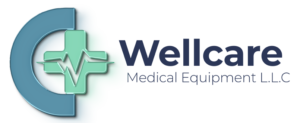Well Care Medical Equipment LLC supplies a comprehensive range of physiotherapy equipment to meet the varied needs of rehabilitation and physical therapy. The types of equipment they provide typically include:
Ultrasound Therapy Machines
Used for deep tissue therapy, these machines apply sound waves to reduce pain, improve circulation, and promote tissue healing. They are commonly used for treating muscle and joint pain.Electrotherapy Units
These devices deliver controlled electrical impulses to stimulate muscles, reduce pain, and improve muscle strength. Common types include TENS (Transcutaneous Electrical Nerve Stimulation) and EMS (Electrical Muscle Stimulation).Traction Equipment
Spinal traction devices help relieve pain and correct alignment in patients with spinal issues, such as herniated discs or sciatica. They stretch the spine to reduce pressure on the vertebrae.Therapeutic Exercise Equipment
This category includes resistance bands, balance boards, therapy balls, and hand grippers. These tools are essential for building strength, flexibility, and balance.Hydrotherapy Equipment
Hydrotherapy baths and pools are used for water-based therapy. They allow patients to exercise in a low-impact environment, which is especially beneficial for joint-related issues and post-surgical rehabilitation.Heat and Cold Therapy Devices
Well Care Medical Equipment LLC provides hot and cold packs, as well as more advanced devices for thermal therapy. These are used to manage pain, reduce swelling, and promote healing.Shockwave Therapy Machines
Shockwave therapy is beneficial for treating chronic pain conditions like plantar fasciitis and tendinitis. These devices use sound waves to promote tissue regeneration and reduce pain.Laser Therapy Devices
These use low-level laser light to stimulate cell repair, reduce inflammation, and relieve pain in conditions such as arthritis or soft tissue injuries.Mobility Aids and Rehabilitation Tools
This includes walkers, parallel bars, exercise steps, and other aids that help patients regain mobility and independence during rehabilitation.Compression Therapy Systems
Often used for patients with poor circulation, these devices apply controlled pressure to limbs, aiding in the reduction of swelling and improvement of blood flow.
Each of these equipment types serves specific therapeutic purposes, enabling physiotherapists and healthcare providers in the UAE to deliver high-quality rehabilitation services. By offering a broad selection, Well Care Medical Equipment LLC ensures facilities have the tools necessary for effective and tailored patient care.
What are the most commonly used physiotherapy machines?
Common equipment includes ultrasound therapy units, TENS machines, interferential therapy devices, heating pads, cryotherapy units, exercise bands, and rehabilitation treadmills.




